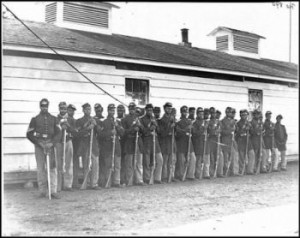
The soldiers of Company E, 4th U.S. Colored Infantry (no available photo of the 14 U.S. Colored Infantry)
William Elgin, Baptist minister, is chaplain of the 14th United States Colored Infantry. As the third full year of the war draws to a close, the Union increasingly depends on the growing ranks of black regiments to provide the extra manpower needed to finally win the war against the rebelling Southern states. Elgin is “a staunch, anti-slavery Republican, a Baptist with a strong moral sense, and a believer in the education and intellectual equality of African-Americans.”
Elgin’s road to the chaplaincy was a bit unusual. A student at Franklin College in Indiana at the beginning of the war, he took breaks from studying to fill the pulpit of the Southport Baptist Church on alternate Sundays. In the summer of 1862 he applied to the church for ordination, only to be denied by the congregation, perhaps for (unspecified) doctrinal reasons. Meanwhile, Elgin had joined with many of classmates in enlisting for military service with the recently-formed 70th Indiana. Desiring to be a chaplain in the unit, Elgin gained the support of 33 of the 70th’s 40 officers, yet the Southport church still refused to reconsider his ordination.
Thus a disappointed Elgin served as a private in the 70th for fifteen months before finally seeing his dream come true when in October 1863 he was appointed as a chaplain in the 14th colored infantry. Ordination followed in December, and Elgin mustered in with the unit on January 1, 1864. The regiment was assigned to the Army of the Cumberland and stationed in Union-controlled Chattanooga. Many white soldiers of the Army of the Cumberland had not previously seen black soldiers.
The young chaplain quickly set about teaching the soldiers, formerly slaves, to read and write, tasks which many other white chaplains of colored regiments also undertake during the latter part of the war. Elgin understood that black men were as capable of whites, if given the opportunity to learn. In his words, “I must educate before I can successfully impart religious truth to them. Their minds must be awakened and disciplined.”
Since the first of the year, Chaplain Elgin has taught the alphabet to 380 men, while helping over 100 begin to learn to read.
This month the 14th regiment, following months of drills, is pressed into duty for the first time. Combat will have to wait until later. For now, a scouting expedition to Sparta, Tennessee is the mission at hand. Over the course of four weeks, the regiment covers some 400 miles on foot, and not without a handicap: they bear weightier backpacks than their white counterparts.
While this is a time of hardship for the new soldiers–some become permanently disabled during the march, a few die from the rigors of the marching–Elgin believes that the black soldiers have “proved their mettle as soldiers and men.”
Months later, on August 15, 1864, the 14th Colored Regiment goes into battle for the first time at the Battle of Dalton, Georgia. During the remainder of the war, the unit is involved in battles and engagements in Georgia, Alabama and Tennessee, fighting bravely and capably and fulfilling Elgin’s confidence in their abilities.
Following the surrender of Confederate Gen. Robert E. Lee at Appomattox, Elgin resigns his commission on May 15, 1865. Private and then Chaplain Elgin keeps a journal from 1862-1864, and it is thought that he returns to Indiana following his service in the army.
The 14th, meanwhile, remains in service until March 26, 1866, the soldiers’ post-war service reflecting the common practice of maintaining the active duty of colored regiments following the war.
Sources: “William Elgin Journal, 1862-1864,” William L. Clements Library, University of Michigan (link); “14th Colored Infantry Regiment, United States Army, Sutler’s Ledger, 1864-1866,” The Southern Historical Collection, University of North Carolina Libraries (link); “14th U.S. Colored Infantry Regiment,” Tennesseans in the Civil War Project (link)


